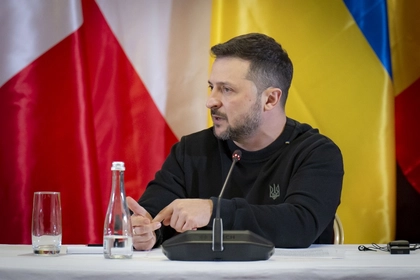A meeting hosted by German Army Inspector General, Lt. Gen. Alfons Mais was held at the Bundeswehr’s OSH Offizierschule des Heeres (Officer Academy) in Dresden from Aug. 27 to 29. Dubbed as a “secret Ukraine-NATO meeting” by the German Bild news agency, senior military leaders from 35 countries, including the United States, Great Britain, the Netherlands, Germany, and Sweden attended.
Unusually in this social media-heavy era the purpose of the get together and its agenda was not heavily publicized. However, the opening statement made by Gen. Mais and the equipment on display probably gave the strongest clues to at least one item under discussion:
JOIN US ON TELEGRAM
Follow our coverage of the war on the @Kyivpost_official.
“We see in the Ukrainian conflict that the use of drones, in particular, has taken a huge leap forward, that drones are now omnipresent on the battlefield. That is why we all have to counter this new threat from the air.”
Because of the information vacuum that surrounded the event, brought about by a Bild source saying participants were instructed not to reveal any information about the meeting on social networks for fear of espionage attacks, the media began to draw their own conclusions.
One hot topic picked up by the press was the fact that Ukraine was represented by Lt. Gen. Oleksandr Pavlyuk, Commander of Ukraine’s Ground Forces. The media speculated that his attendance, rather than that of Commander-in-Chief Oleksandr Syrsky, could be an indication that he was in line to replace his boss. This overlooked the fact that Syrsky was currently fighting a war on several fronts.

Ukraine’s Lost 40% of Kursk Region Gains Official Says
At the same time as the Dresden conference, a meeting of the NATO-Ukrainian Council at Ambassadorial level was being held at Kyiv’s request in Brussels on Aug. 28. The meeting, which was addressed by President Volodymyr Zelensky followed the massive Russian missile attack against Ukrainian civilian infrastructure two days earlier.
The NATO Secretary General Jens Stoltenberg underlined the need for NATO and its members to provide continued military support to Kyiv:
“Ukraine continues to intercept Russian missiles on a daily basis, saving countless lives. But Ukraine’s ability to maintain their defenses requires increased supply and more support. In the wake of the latest Russian assault, Allies today reaffirmed they are stepping up their military aid to Ukraine. We must continue to provide Ukraine with the equipment and munitions it needs to defend itself against Russia’s invasion. This is vital for Ukraine’s ability to stay in the fight.”
Those attending the Dresden conference were shown examples of some of the latest examples of German military equipment including the Skyranger wheeled anti-drone air defense system, which uses the 35 mm Skynex cannon capable of destroying UAVs at up to nine kilometers. They were also shown the Remote-Control Howitzer (RCH) –155mm unmanned wheeled howitzer capable of firing nine rounds a minute up to a range of 54 kilometers (33.75 miles). In 2025,Ukraine is slated to receive over 50 of the howitzers in 2025 and has already taken delivery of an undeclared quantity.
You can also highlight the text and press Ctrl + Enter






